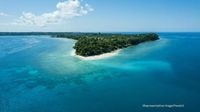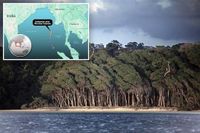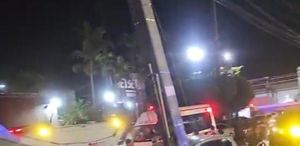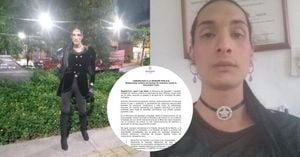Mykhailo Viktorovych Polyakov, a 24-year-old American YouTuber, has been arrested after allegedly attempting to make contact with the Sentinelese, one of the world’s most isolated tribes, on North Sentinel Island in the Andaman and Nicobar Islands. This incident has raised significant concerns about the safety of both the individual and the indigenous people, who have had minimal contact with outsiders for thousands of years.
On March 29, 2025, Polyakov made his way to the restricted North Sentinel Island, where he reportedly left behind a can of Diet Coke and a coconut on the shore. According to the Andaman and Nicobar Islands police chief HGS Dhaliwal, Polyakov blew a whistle for about an hour in an effort to attract the tribe's attention. He spent approximately five minutes on the island, during which he filmed a video and collected sand samples before departing.
Upon his arrest, which occurred two days after his landing, Polyakov was presented before a local court and is currently on a three-day remand for further interrogation. He described himself as a "thrill seeker" and was reportedly wearing a GoPro camera during the incident, claiming to represent the United States unofficially.
Polyakov's actions are particularly alarming given the history of violent encounters between outsiders and the Sentinelese. In 2018, John Allen Chau, a 26-year-old American missionary, was killed by the tribe after he attempted to convert them to Christianity. His body was never recovered, as the Indian government prohibits access to the island to protect the tribe from outside diseases, which they have no immunity against.
Survival International, an advocacy group focused on the rights of indigenous peoples, condemned Polyakov's actions, stating, "It beggars belief that someone could be that reckless and idiotic. This person’s actions not only endangered his own life, they put the entire Sentinelese tribe at risk. It’s very well known by now that uncontacted peoples have no immunity to common outside diseases like flu or measles, which could completely wipe them out." This statement highlights the severe implications of such reckless behavior.
The Indian government has implemented strict regulations to protect the Sentinelese and their way of life. Access to North Sentinel Island is strictly prohibited within three nautical miles, and anyone attempting to visit faces severe penalties, including imprisonment. Polyakov now faces a potential prison sentence of three to eight years for violating these laws.
This was not Polyakov's first attempt to reach the island. He had previously made two unsuccessful attempts: the first in October 2024, when he was stopped by hotel staff while trying to use an inflatable kayak, and the second in January 2025, when he boarded a motorized inflatable boat and sailed for over nine hours to reach the restricted territory.
The Sentinelese, who are believed to number around 150, have lived on North Sentinel Island for nearly 60,000 years, maintaining a lifestyle that is largely untouched by modern civilization. Their isolation has led to a deep distrust of outsiders, and any attempts to contact them have historically been met with hostility. This is why the Indian government has taken such drastic measures to safeguard the tribe from external threats.
Polyakov's case has sparked renewed discussions about the ethics of engaging with uncontacted tribes and the responsibilities of individuals who seek adventure without considering the consequences. The potential impact of introducing outside diseases to the Sentinelese population is a pressing concern, as even minor illnesses could have devastating effects on their community.
As the legal proceedings against Polyakov unfold, the incident serves as a stark reminder of the delicate balance between curiosity and respect for indigenous cultures. It raises important questions about the lengths to which individuals will go for the sake of adventure and the potential repercussions of their actions on vulnerable populations.
In light of this incident, experts emphasize the need for greater awareness and understanding of the rights of indigenous peoples and the importance of preserving their autonomy. The Sentinelese, like many other uncontacted tribes, deserve to live free from external interference, and it is crucial for society to respect their choice to remain isolated.
Overall, the arrest of Mykhailo Viktorovych Polyakov not only highlights the risks associated with attempting to contact isolated tribes but also underscores the ongoing challenges faced by indigenous communities in preserving their way of life against encroaching modernity.








